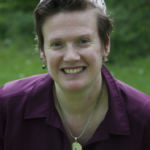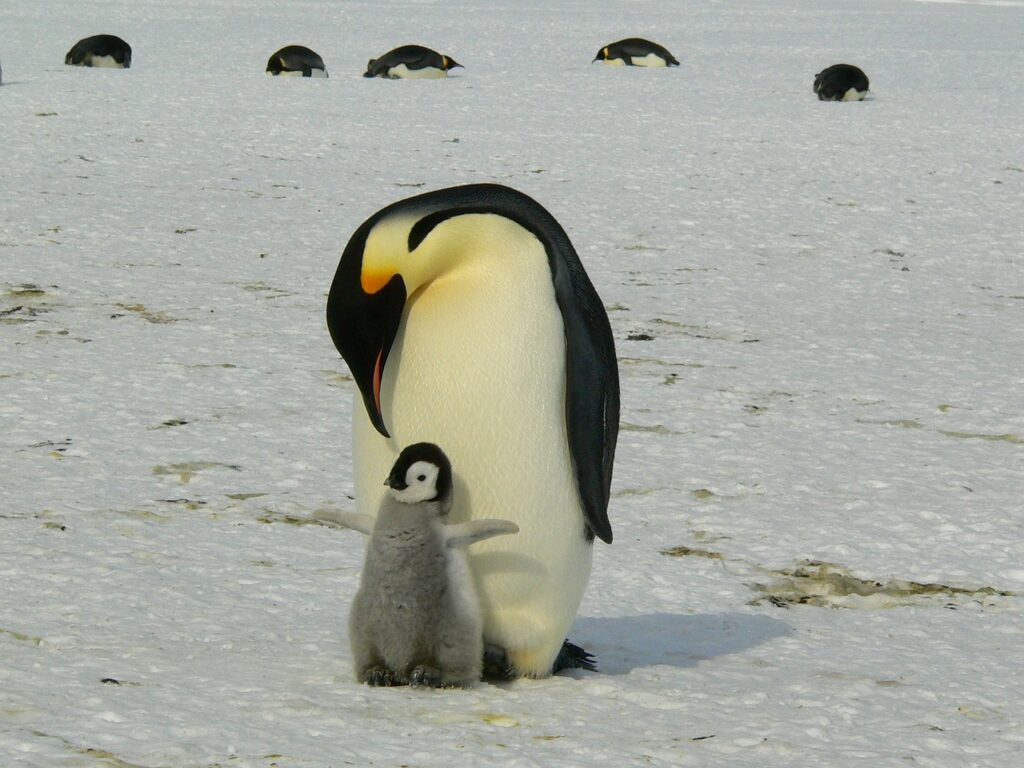![]() This teaching includes an optional writing prompt.
This teaching includes an optional writing prompt.
“Though my father and mother abandon me, God will gather me in.” (Psalm 27:10)
Last summer, I spent a week in “cottage country” in Quebec with the board of directors of Bayit, a spiritual innovation incubator that a few years ago I helped to found. One of the joys of being on that board retreat is time for spiritual practice, so every morning we would wake up, put on our prayer gear, and walk outside to davenLit. Pray (Yiddish) Particularly, praying in a traditional manner, mouthing the words of the prayer softly while swaying. – to pray – by the lake.For the last few years, our retreat has coincided with the start of Elul, and last year was no exception. On the first morning of Elul, we went out to the lake with our siddurim and a shofarA ram's horn that is blown on the High Holidays to "wake us up" and call Jews to repentance. It is also said that its blast will herald the coming of the messiah.. As always during Elul, I dipped into Psalm 27. And when I reached this line, I stopped, unable to go on.
“Though my father and mother abandon me, God will gather me in.” (Psalm 27:10)
My mother, of blessed memory, died in 2019 after a long illness. We dedicated her headstone just a few weeks before we all became aware of the Covid-19 pandemic and started sheltering-in-place. My father, of blessed memory, died in March of 2022. Which meant that last summer, when we reached the start of Elul, I was still in the first year of mourning my second parent… and when that line landed in my heart, it landed hard.
I remember being overcome by weeping. I remember a friend placing a hand on my shoulder blade and just being there with me as I cried. I remember that, after a while, my sobs subsided and I took a deep, shuddering breath.
And I remember an enormous bird suddenly overhead, a heron or an egret – stately and grey with a tremendous wingspan – circling over us, dipping as though to say hello, and then soaring away.
“Though my father and mother abandon me, God will gather me in.” (Psalm 27:10)
My parents have left this life. They lived long years, and they embraced every joy they could find, and now they are gone. But I still feel them with me, sometimes: when I walk past a photograph, if I catch a whiff of cigar smoke or Bal à Versailles perfume… and when a red-tailed hawk follows me from tree to tree as though keeping an eye on me, or a Great Egret circles overhead to remind me that I am not alone. That’s one of the ways I’ve come to understand the line, “Though my father and mother abandon me, God will gather me in.” (Psalm 27:10) The specifics of who my parents were are gone, but the Source of All remains.
For a child to bury their parent is the natural order of things, and time has smoothed the once-sharp edges of my mourning like sea glass tumbled by the tide. Some of you listening to this may be nodding in recognition: maybe you’ve been here, too. And maybe some of us are mourning other losses: a mentor or teacher with whom we’ve lost touch, the deaths of our elders, a friendship that was once sustaining, but has now become toxic or simply faded away.
I know, also, that not every parent is good to their children, and the same is true of our teachers, our elders, our friends. Some relationships need to end. Maybe we’re the ones doing the abandoning in order to keep ourselves safe. We may still mourn what we’ve lost or what we imagine we could have had.
I think about all those who have nurtured us, whether parents or teachers, elders or friends. It’s not easy to sit with the impermanence of those relationships and the impermanence of our own lives. It’s not easy to sit with what hurts, without lurching to slap a Band-Aid over our losses. My practice is to let the tears come, when they come … and then to look and listen in the stillness after crying, the calm after the storm. Notice the fragrance of wild thyme underfoot, or the heron overhead: the creatures and creations that come from beyond us, our place in the order of things.
The psalmist writes, “You gather me into your sukkahLit. hut or booth A temporary hut constructed outdoors for use during Sukkot, the autumn harvest festival. Many Jews observe the mitzvah of living in the Sukkah for the week of Sukkot, including taking their meals and sleeping in the Sukkah. on a foul day.” (Ps. 27:5) Even when we grieve, we are sheltered beneath the shadow of God’s wings. In the metaphor of ingathering, there are hints of harvest, as though we are the harvest God collects when our time has come.
At the end of this season of teshuvah, we’ll enter our own sukkotLit. Booths or huts Sukkot is the autumn harvest Festival of Booths, is celebrated starting the 15th of the Jewish month of Tishrei. Jews build booths (sukkot), symbolic of the temporary shelters used by the ancient Israelites when they wandered in the desert. Traditionally, Jews eat and sleep in the sukkah for the duration of the holiday (seven days in Israel and eight outside of Israel). The lulav (palm frond), willow, myrtle, and etrog fruit are also waved together.. It’s traditional to invite ushpizinLit. Guests (Aramaic) Biblical "guests" invited into the sukkah on each of the seven nights of the holiday. While the traditional ushpizin were all male, a new custom has been created, inviting female guests (ushpizot) as well. The seven ushpizin are Abraham, Isaac, Jacob, Joseph, Moses, Aaron, and David. The seven female ushpizot are Sarah, Rebecca, Rachel, Leah, Miriam, Abigail, and Esther., ancestral guests, into the sukkah. We can choose to invite our dead, our literal ancestors, along with teachers and mentors who are no longer in our lives: people who nurtured us and who have left us, though their imprint remains.
An invitation into a letter-writing practice: set a timer for seven minutes, and try to keep writing the whole time. (If you’re in the groove when your timer goes off again, you can always keep going.) Open a new document or take a piece of paper, and begin by writing at the top, “Dear Mom” – or whoever it is who’s left you, in whatever way.
Write, “thank you for nurturing me,” and tell them how they did so.
Write, “thank you for giving me,” and then tell them what gifts from them you carry with you.
If there are hurts or unresolved issues, you can name them. You can be direct: you don’t need to equivocate here. Take responsibility for what’s yours, and don’t take responsibility for whatever is theirs. When you’re ready to end the letter, consider whether you want to bring this relationship with you into your sukkah.
When you’re done, sit for a moment. Imagine how it will feel to enter your sukkah in a few months’ time: welcoming these ushpizin, or welcoming others. Imagine that the whole world is God’s sukkah, and that we are all sheltered there. How does it feel now, to hope, or to affirm, that no matter who has abandoned us, God will gather us in?
 Rabbi RachelLavan's younger daughter and Jacob's beloved wife second wife (after he is initially tricked into marrying her older sister, Leah). Rachel grieves throughout her life that she is barren while Leah is so fertile. Ultimately, Rachel gives birth to Joseph and dies in childbirth with Benjamin. Rachel is remembered as compassionate (she is said to still weep for her children), and infertile women often invoke Rachel as a kind of intercessor and visit her tomb on the road to Bethlehem. Barenblat, a founding builder at Bayit: Building Jewish and a fellow of Rabbis Without Borders, was named in 2016 by the Forward as one of America’s Most Inspiring Rabbis. She holds dual ordination as rabbi and mashpi’ah (spiritual director). Since 2011, Rachel has served as spiritual leader of Congregation Beth Israel of the Berkshires (North Adams, MA). She holds an MFA in Writing and Literature from the Bennington Writing Seminars and is author of six volumes of poetry, among them 70 faces: Torah poems (Phoenicia Publishing, 2011), Open My Lips (Ben Yehuda Press, 2016), Texts to the Holy (Ben Yehuda 2018), and Crossing the Sea (Phoenicia, 2020). Since 2003 she has blogged as The Velveteen Rabbi, and in 2008 TIME named her blog one of the top 25 sites on the internet.
Rabbi RachelLavan's younger daughter and Jacob's beloved wife second wife (after he is initially tricked into marrying her older sister, Leah). Rachel grieves throughout her life that she is barren while Leah is so fertile. Ultimately, Rachel gives birth to Joseph and dies in childbirth with Benjamin. Rachel is remembered as compassionate (she is said to still weep for her children), and infertile women often invoke Rachel as a kind of intercessor and visit her tomb on the road to Bethlehem. Barenblat, a founding builder at Bayit: Building Jewish and a fellow of Rabbis Without Borders, was named in 2016 by the Forward as one of America’s Most Inspiring Rabbis. She holds dual ordination as rabbi and mashpi’ah (spiritual director). Since 2011, Rachel has served as spiritual leader of Congregation Beth Israel of the Berkshires (North Adams, MA). She holds an MFA in Writing and Literature from the Bennington Writing Seminars and is author of six volumes of poetry, among them 70 faces: Torah poems (Phoenicia Publishing, 2011), Open My Lips (Ben Yehuda Press, 2016), Texts to the Holy (Ben Yehuda 2018), and Crossing the Sea (Phoenicia, 2020). Since 2003 she has blogged as The Velveteen Rabbi, and in 2008 TIME named her blog one of the top 25 sites on the internet.












2 Responses
Thank you for this teaching. My father died just before the High Holy Days in 2007, on 14 Elul, at a time when I was beginning to participate in Jewish practice but had not yet converted. These words from Psalm 27 were like a knife to my heart. I wept throughout the services I attended that year. Three years later, on 1 Elul, my mother died. That same year, my college roommate, who was a Cantor, passed on Simchas Torah. The accumulation of losses sent me straight to a nearby Reconstructionist synagogue where I converted the following spring. The accumulation of personal/spiritual losses pointed me in the direction of my new faith/peoplehood/community.
Awesome👍 studies